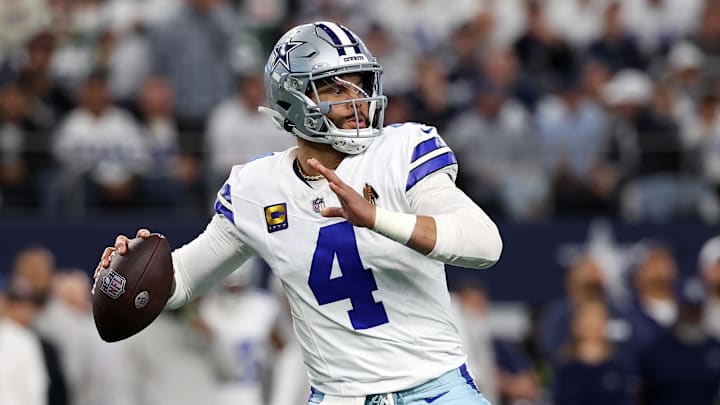Dak Prescott’s New Contract Has Ramifications Far Outside of Dallas

Dak Prescott continued his mastery of the Dallas Cowboys at the bargaining table this weekend by signing another (relatively) short-term extension with a very high percentage of guarantees, which—at age 31—will likely allow him to come up for at least one more big deal before his playing days are over. He has proven, time and time again, that the key to dealing with the Jones family is to simply compartmentalize: Never react to their carnival-style side games, which involve loaded comments and the coy dangling of a developmental quarterback as a possible successor, and understand that the longer they stall, the more likely they are to blink.
I hope this has down-the-line ramifications for Micah Parsons, who now stands in the batter’s box as the next player preparing to take his whack at the financial pinata. I hope he dons a pair of noise canceling headphones for the next 365 days and emerges, without question, as the highest-paid nonquarterback in NFL history at this time next year. But as it pertains to Prescott specifically, the global ramifications of this signing outside of Dallas are fairly significant, too.
While Prescott agreeing to an extension was not a surprise, it did take until 30 minutes before inactives were due on Week 1 for the ink on the contract to dry. Prescott was as close to free agency as we’ve seen a true, in-prime, largely healthy, off-field-issue-free franchise quarterback in recent times.
Every team is focused on opening weekend, but I wonder how many general managers and owners winced when they saw that Prescott will not be available this offseason. A quick scroll around the NFL and a short projection of next season’s quarterback market shows a dire need for capable veteran quarterback play and a relative absence of it emerging on the open market any time soon. Indeed, last year around this time, one agent guessed that Prescott could field up to $70 million per season if he reached true free agency (according to multiple reports, this extension is for four years and $240 million, which is still a market reset and provides a stage for a QB to soon eclipse $60 million per season).
The way this season actually plays out could prove me wrong, but the New York Giants, New York Jets, Las Vegas Raiders, Cleveland Browns, Pittsburgh Steelers, Tennessee Titans, Los Angeles Rams, Seattle Seahawks, Carolina Panthers, New Orleans Saints and maybe others would all seem to have a vested interest in Prescott’s future, which not only underscores the dire quarterback situation we find ourselves in but the ridiculousness of the theater that accompanies so many of these negotiations.
Had Dallas not re-signed Prescott, it would have stood above and beyond the most foolish maneuvers made by a semicompetitive franchise in modern NFL history. The Cowboys have continued to luck into generational talents at the quarterback position (finding them without expending much draft capital) and, while they have failed to build complete teams around those players and facilitate environments that yield success, they have yet to let a good thing go without something of a guarantee already in the building.
Credit Jerry Jones for this at the very least.
Now, we look ahead to the pending QB market next year with a little more than a sigh. Mac Jones, Drew Lock, Jameis Winston, Zach Wilson, Jacoby Brissett, Sam Darnold, Joe Flacco, Taylor Heinicke and so on. A kind of abyss that will once again force the truly desperate to encircle Kirk Cousins’s camp and wonder how much gold bullion must be added to another fully guaranteed deal for two years of his mercenary services.
It forces the league deeper into this do-or-die scenario, where teams must either find brilliant coaches who can translate college offenses for still-developing and unready quarterbacks and make said offenses effective against far better and more advanced defenses. That, or luck into a generational player at the top of the draft but still possess enough roster strength that said player doesn’t get ruined by the development of bad habits.
Ultimately, this is why Dallas blinked and signed the deal before the season started. The front office was always going to blink and sign the deal. We could wonder how much the lack of proactiveness cost them in the long run, but all that matters now is that the franchise is not waiting in the bread line for quarterback scraps come springtime.
All things equal, Dallas is thrilled. A large handful of other NFL teams probably sees this as an opportunity missed.
